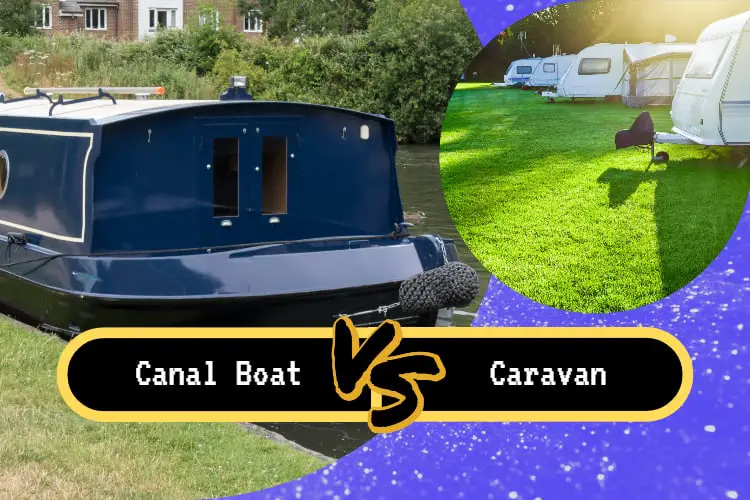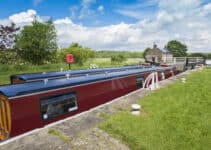For those of you that want to explore Great Britain or even live an off grid life, there are two main options that a lot of people choose. Today I want to go over the pros and cons of these options to help you decide which might be best for you. What is better? Canal Boat or Caravan….lets find out together!
I imagine that if you managed to get to this article, you probably know what a canal boat and a caravan is. Just to be clear, let’s start by going over the different types you can live and travel extensively in.
What Types of Canal Boats can You Travel in?
There are three main types of canal boat. The first is the GRP cruiser, sometimes known as a river cruiser. These are fibreglass based boats that are often referred to as ‘yoghurt pots’ and look more like a traditional boat. These GRP cruisers are cheaper to buy, however, they are not as long lasting as a traditional steel canal boat. Also, you have to be careful that you buy one that can fit through all the canals and tunnels. Boats traditionally used on rivers can be somewhat wider, and that’s what a lot of these were originally designed for.

Then we have the more popular option, the narrowboat. These boats used to be used years ago as the supply chain for transporting commodities around the country, but more recently have become a popular option for exploring and traveling in. These are usually flat-bottomed boats that are of course narrow and long in nature and have a hull made from steel.

The final main type of canal boat is a wide beam. As the name suggests, the wide beam canal boat is much wider than a narrowboat. This offers much larger living areas but of course costs more to run and limits some of the canals you can travel on. You will often see other wide beam barges on the canals. Often these are old Dutch barges converted with living quarters and offer something similar to a wide beam.

What Types of Caravans can You Travel in?
This is a lot simpler to explain, as there is pretty much only one type of caravan you can buy. A caravan is essentially a living quarter you tow behind your vehicle and comes in various sizes. People in the UK have been using caravans for many years as a cheaper way to go on a holiday. Caravans are often made out of lightweight materials such as fibreglass.

The main thing you will need to choose is whether you go for a single or twin axle caravan, which very much depends on the size.
You can also buy folding caravans or pop top caravans, which are often smaller caravans used for shorter trips (time wise), and they have the benefit of being more compact and easier to transport than a regular caravan.
Caravans VS Canal Boats: The ShowDown
We are going to compare the canal boat and caravan using the following key factors:
Mobility
The caravan wins this round, hands down. As a caravan is towed by a vehicle, it can go anywhere that has roads, and even dirt roads if you have a vehicle and caravan that can handle light off-road. This makes the caravan a versatile and very mobile option.
The canal boat, on the other hand, is restricted to the canal network (funny that!) and inland rivers, which have decent coverage but certainly won’t give the amount of options the road going caravan has.
A caravan could also be parked in a wider variety of locations, whereas the canal boat is restricted to moorings along the side of the canal network.
Speed
The caravan wins this round for me personally, as it is able to go much faster than a canal boat (which often potter along at walking speeds at best!). So if you are in a hurry or like to go to different locations quickly, the caravan is for you.
Space
Although you can buy decently sized caravans, you will usually find more space inside the average canal boat. Of course, there are small boats but the option is there for a 70 foot narrowboat or such like, where you will get all the space you want. Realistically, such a spacious option is not available in caravan form (UK roads don’t allow for massive RV’s like in the US of A!).
Comfort
Modern caravans are nice and all, but for me this round goes to the canal boat (especially the narrow boat). A narrow boat’s interior is a homely yet functional place to be when designed right. It will offer you everything you might get from a land based home, along with a surprising amount of space for something mobile.
The caravan can have a nice interior with many home comforts, but it always comes across as more sterile and boring to me. You can’t beat the rustic charm of a nice narrowboat interior, and the comfort that goes with it.
Practicality
It depends on your idea of practicality, but for me the caravan wins out here, especially if you still want to keep a land based home. You can easily park a caravan on the driveway of your land based home, giving you the option for exploration or staying put at home.
This would be much harder on a canal boat, unless your home literally backs onto a canal (which is possible but probably expensive and in shorter supply).
How about storage? This is the only part of practicality that the canal boat wins! A caravan has to remain light, so doesn’t have that much storage. You are going to struggle to bring all your wordly possessions around with you in one. However, a narrow boat can get pretty heavy and still float away fine (something about less resistance floating on water apparently!). You can store far more on one, making it much more viable as a ‘mobile home’.
Ease of Use
This one goes down to the caravan. The fact that the propulsion is a separate entity (in the form of a car), makes a caravan very easy to use. Anyone can learn to drive a car easily and thus can move a caravan with little hassle. Most caravans have modern appliances and systems inside that are often user friendly and simple to use and learn. Just be aware that if you aren’t a confident driver, you may find maneuvering a caravan (especially reversing) more challenging and therefore less appealing.
The canal boat is another matter entirely. Only a small percentage of the population have ever ridden on a canal boat, never mind helmed one. It’s not rocket science, but it definitely isn’t as easy as you might think. Also, these boats are retro fitted with all kinds of combinations of equipment, meaning no one narrowboat is the same. This means you need to learn a wider range of systems that are not always user friendly to operate. As a caravan is put together by a single manufacturer, they make sure that it is a complete and easy-to-use package.
The advantage a canal boat has is that a lot of the canal network is much quieter than a typical road, so you will have time and less angry people to deal with if you have any issues moving or controlling your canal boat.
Cost
This one is tough to call, but I reckon I would plump for the canal boat here. Canal boats can be more expensive than caravans, but you will find a full range to suit any pocket. It is possible to pick up a GRP cruiser in decent condition for not much money and you could be set. For £2k, you could end up with something workable. It is going to be harder to find a workable car and caravan combo for that amount of money in my experience. And I would much rather be floating down canals in a cheap boat than cruising the motorways with a cheap car and caravan combo! I feel like a disaster is much more likely to strike with the latter!
Then, when we think about running costs, I would say that the caravan option is slightly ahead here. The thing is, a canal boat needs a Canal and River Trust licence, a safety licence, engine maintenance and could cost you a fair bit on repairs (especially if you buy a dodgy old narrowboat with a paper thin hull). On the other hand, a caravan itself doesn’t need all of these different things to upkeep and run, but be aware that you will have to pay for the upkeep of a decent car to pull said caravan.
When you budget it all out, I reckon the costs would be similar. Answers on a postcard if you disagree 🙂
Investment
A caravan has to be lightweight, so it is often made from fibreglass and different types of plastic. If it gets too heavy, it is going to be a pain in the ‘you know what’ to move around. A narrow boat, on the other hand, can be heavy and still get around fine. So it can be made from more solid materials, such as steel. Yes, you will probably end up paying more for your narrowboat than your caravan, but you are buying something that is solid and long lasting. You can’t say this as much for a fibreglass caravan.
With a recent article I looked into how much a narrow boat depreciates, and I was surprised at how little this is (especially if you don’t buy a brand new boat). This is helped along by the fact that the canal boat market is hot at the time of writing and things sell for good prices and quickly!
Experience
This is the main difference that I think will seal this decision for many people. I don’t know if you have noticed, but the tagline for my website is ‘live life in the slow lane’. This should give you a hint as to the experience on offer here. Most of the time, you are serenely cruising down canals surrounded by nature. I have heard many new canal boaters say that this has helped them see nature in the UK that they thought never existed. You may be surprised at the beauty of the British countryside, and with canal boating, you will be fully immersed in it! If you are sick of the fast pace of modern life, this could be the route for you….literally!
Add to this the fact that you can find some beautiful moorings that you can stay in for up to 14 days for the price of your Canal and River Trust licence, and you have a recipe for a simple but relaxing life in the British wilds!
On the other hand, the caravan does give you the opportunity to ‘camp’ in the British countryside, but you are more restricted. For starters, you can’t just pull over at the side of a road and sleep in your caravan. National Trust car parks don’t allow people to sleep in caravans overnight either. And add to this the unfortunate stigma that caravans have in the UK. Firstly, there are a lot of them, so governments and councils don’t want people just camping out anywhere in them. They would prefer you to go to a designated campsite. This is also because caravans are often associated with Romany Travellers in the UK, an association which is (rightly or wrongly) a negative one. So if you just park up your caravan in an empty field, you could bring unwanted attention from the authorities.
Yes, it is possible to find some secluded country locations, but it is going to be a struggle at times. And a caravan doesn’t allow you to stealth camp. If you want to do this and expand the places you can stay, you should look into a stealth camper van instead 🙂
Canal Boat VS Caravan: What would I recommend?
If you are someone that wants to maintain a land-based home and use this as your holiday/ adventuring option, you would probably want to opt for a caravan. Especially if you have a family and want a simple holidaying experience.
If you are using this as a permanent home or somewhere that you will stay for extended periods of time, then canal boating is the way to go. You can have a much better floating home this way, especially if you go for a narrowboat. I don’t see caravans working well for anything other than short holidays, unless you like the idea of staying on campsites and paying for the privilege. If that is the case, you may even find a mobile home (otherwise known as a static caravan) more attractive (although this can’t be moved around easily).
Finally, if you have a stressful life and are looking for a way to unwind and de-stress, there is only one option….canal boating. Yes, in the Summer some parts of the canal network can get busy, but other than this you will find it a mostly slow paced and relaxing lifestyle.
However, these are just my opinions. I would recommend looking at the pros and cons for yourself and seeing what best fits your requirements. Everyone is different, after all! And why not hire a caravan and a narrowboat for holidays before taking the plunge, so that you can get a realistic experience with both options.



![What Happened to Cruising The Cut [Narrowboat Youtuber]](https://canalboatuk.com/wp-content/uploads/2022/08/cruising-the-cut-youtube-channel-211x150.png)

Appreciate this article was written with good intentions, but there’s so many things wrong with it and takes a very narrow minded view.
It says “[there’s] pretty much only one type of caravan” – This is false, there’s touring caravans and static caravans and less commonly folding caravans. All with their own individual merits and you could write an essay on the pros of cons of each vs. a caravan!
The article also states that “canal boat, on the other hand, is restricted to the canal network” – again this is false. Canal boats can traverse navigable rivers too, of which there are many!
Apparently caravans win on the subject of speed. – What if you only want to travel at a slow pace and don’t want the hustle and bustle of our road network? It’s a subjective matter. I don’t see how either one can win given it’s a matter of preference.
“You can easily park a caravan on the driveway of your land based home” – This is misleading. Many driveways are too small to accommodate a caravan, especially those adjoined to modern homes. Also, many estates have covenants banning the use of parking caravans.
I’m not sure how caravans are easier to use, it differs from person to person. Hitching up to a caravan, reversing and manoeuvring in tight spaces/lanes may not be easy at all, especially for people travelling solo or those who are less mobile. Again, it depends on the person & situation but I certainly found narrow boating to be easier and less stressful as a solo traveller in my 30s.
Sorry but canal boats are NOT typically cheaper than a touring caravan. This is extremely misleading. With a boat, you need:
– Boat Safety Certificate
– Engine servicing
– Insurance
– Dry docking / blacking / re-painting / welding etc
– CRT licence
This only scratches the surface. Caravans are not required to have any of these things. Touring caravans are typically much cheaper to maintain. Your example of paying for the upkeep of a decent car is moot as most people will have a car anyway!
You mention a caravan has to be lightweight. Have you seen the weight of those massive Hobby caravans? They are certainly not lightweight! They don’t HAVE to be lightweight per se, they just have to be suitable for your towing vehicle. As such, if you’re fortunate to be driving a Land Rover Discovery or similar, you can tow a rather large/heavy caravan. Granted, it’s probably not going to weigh as much as a narrow boat!
You mention that caravans are more restricted. I am not sure how this is the case when it is possible to tour across the globe in one should you wish. Not so easy in a canal boat! But yes, it’s more difficult to be spontaneous in a caravan and more planning is required.
Interesting article but there’s so many misleading/inaccurate points. I recommend revisiting it.
Hi Rich, thanks for your very detailed comment and indeed this will help me revisit and improve this article. I admit I have more experience with canal boats than caravans so I may have come across biased in some way. Thanks for taking the time to point this out 🙂